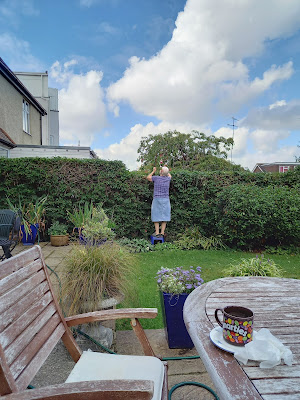10:00 Lois and I drive off to Gotherington Nurseries to buy a birthday gift for our friend Mari-Ann, It's also a bit of an adventure for us to actually go into a shop and pay for something, which is nice!
our friend Mari-Ann (right)
some possible routes for us - we decide to take the quick way
(call us crazed petrol-heads if you like! [All right I will ! - Ed]
this is what Lois picked out for Mari-Ann's present
- I think it's called a cyclamen, but I could be wrong!
pleased with our purchase we find out car in the car-park and drive home
We like to go to Gotherington, because it has happy memories for us - it's where our elder daughter Alison got married to Ed in 1999.
flashback to August 1999 - our daughter Alison gets
married to Ed at Gotherington
Lois and me - parents of the bride: happy days!
I get the coffees and biscuits ready, but Lois has disappeared
down to the bottom of the garden
she comes back carrying a long stick - yikes!
we have our coffees and biscuits
Lois uses the long stick to support a rogue fuchsia
that's been growing up inside the hedge se share
with our neighbour Bob: phew, that's a relief !!!!
12:00 I do a bit of work on my so-called "presentation". I've agreed to give a talk next month on zoom to members of Lynda's U3A Middle English group: the talk is all about the influence of the Vikings' language - Old Norse - on the history of the English language.
One of the most unusual things about this subject is that English borrowed the Norse words "they", "them" and "their" from Old Norse, and ditched their own original words for these pronouns. Pronouns are such basic things in a language, and I think this is possibly the only known case in history where one language has borrowed pronouns from another language.
The original Anglo-Saxon equivalents for "they", "them" and "their" have more or less completely disappeared. The only remnant of them is when we say " 'em " or " 'm ", instead of "them", as in "Love 'em and leave 'em" and countless similar phrases: few people know that this isn't a lazy short-cut - it's the original English form.
What a crazy language we speak !!!!
"Love 'em, leave 'em" - what madness !!!!!
My sister Gill's recent DNA test revealed to us a whole load of relatives we didn't know we had, and we have a marriage connection with a bunch of people with Sarawakian blood. Who would have guessed that?
Mine and Gill's Aunty Joan, who never married, had at least one and possibly two sons by a man called Peter, who married a woman called Elizabeth K., the daughter of an English father, the mining engineer John, and a Sarawakian mother, Poing-Ah-Lian, apparently John's mistress.
some typical Sarawakian women in traditional dress
Every day Lois's research turns up new bombshells. Today Lois finds out that Peter and Elizabeth K.'s legitimate daughter, called Elizabeth A., married a man called Tom who had inherited a Gloucestershire stately home as a teenager in the 1960's. He actually declared himself a "gentleman" on the "occupation" field of his marriage certificate. My god!
But it seems that inheriting this stately home was a bit of a poisoned chalice for poor Tom - it seems to have been falling down, basically, - the archetypal "crumbling country pile", so he had to sell it a few years later.
a typical "crumbling country pile" - not Tom's !!!
What a crazy world we live in !!!!!
18:00 We have dinner - kedgeree followed by Lois's home-baked blackberry-and-apple pie with custard: yum yum!
She made lots of both dishes, so there's more to come in the next few days, which is a nice thought.
the scene later that evening in our abandoned kitchen -
lots of left-over kedgeree and blackberry-and-apple pie still to come
over the weekend: yum yum!
They were amongst the first Allied troops to hit Omaha Beach in Normandy and they came under deadly German fire, suffering the highest casualties of any of the D-Day landings.
The area had also become a base for French clandestine operations earlier in the war. When Charles de Gaulle left occupied France he visited this area, because Winston Churchill had set up the Special Operations Executive to do clandestine operations on the Continent.
After de Gaulle arrived in England he made a broadcast to the French people telling them to hold on, and to keep up resistance. The broadcast led to something of an exodus of French and Belgian fishermen, arriving in their fishing boats in Cornwall.
These boats were later used for secret operations to northern France, because they could blend in with the Brittany fishing fleet. On clandestine operations these boats took with them Cornish sailors and British servicemen, dressed up as Breton fishermen to fool the Germans. They did such things as dropping off equipment, and picking up allied airmen who had made it to the French coast.
Cornish sailors and British servicemen dressed up as
Breton fishermen to fool the Germans - my god !!!!
Fascinating stuff !!!!
22:00 We go to bed - zzzzzzzz!!!!!!
.



























No comments:
Post a Comment